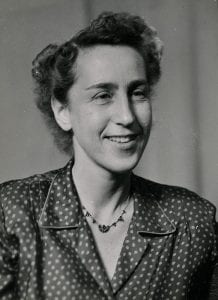Hilde L. Mosse, “The Misuse of the Diagnosis of Childhood Schizophrenia,” The American Journal of Psychiatry 114 (1958):791-94.
Complete original source available here.
Hilde Mosse was born in Germany in 1912 to a very wealthy Jewish family. She began her medical studies in Germany, but after the rise of Nazism caused her family to flee, she completed her medical degree in Switzerland in 1938 and then moved to the United States, where she did her internship in Schenectady, New York. She was a pediatrician who specialized in reading disorders as well as a child psychiatrist. In 1946, Mosse helped to found and fund the Lafargue Clinic in Harlem, the first mental health clinic in that community. She also worked as a school psychiatrist for the New York Bureau of Child Guidance and the New York Board of Education, and taught child and adolescent psychiatry at New York Medical College. Her perspective on childhood schizophrenia and its treatment was unusual at the time, but it anticipated numerous critiques of medicine’s social biases advanced by health activists and policy reformers during the 1960s.
There has been an enormous increase in the diagnosis of childhood schizophrenia. We find ever larger numbers of cases both in the psychoanalytic and general child psychiatric literature. Few cases have been followed into adulthood, and where it is reported that the diagnosis was then confirmed, this is still open to question because of the prevalence of confused and inconsistent diagnostic criteria also in adults.
Schizophrenia is not a disease of childhood. Its onset is in adolescence and pre-adolescence….
The present trend to diagnose children with severe emotional and mental symptoms as schizophrenic is scientifically wrong and has had serious practical consequences. It has filled state hospitals and schools for mental defectives. Children in trouble for many reasons are now likely to be so diagnosed.
We have studied 60 such cases below the age of 14 at Lafargue Clinic and in private practice. In practically all of them the diagnosis was wrong….
A child who commits a crime is now likely to be diagnosed schizophrenic and sent to a mental hospital. This puts the problem into a wrong focus, namely into the field of mental illness of unknown origin inherent in the child, instead of into the field of social pathology to which the child is reacting….
Many boys now on the wards of this and other hospitals got into trouble because of gang membership and are not psychotic….
This happened to Robert, age 9. He was sent to a mental hospital for truancy, running away from home and stealing. The diagnosis of childhood schizophrenia was based primarily on the following factors: “On occasion he thought people were following him and was compelled by some introjected body to do things like steal and stay away from home.”….
Frequently children tell us: “a voice told me to hit him” or “the devil told me to kick her.” The child may consciously want to show that he is not responsible for the bad things he does. Some children grow up in an environment where the devil is considered a reality, and forbidden deeds and thoughts are explained by the devil having entered the person. Some children we have seen have been told that spirits exist, can come to life, talk to people and influence them. Actually, Robert had run away from home because of a cruel mother and step-father. He stole money because he needed it. Our clinical examination, tests and play-group observation showed no evidence of schizophrenia. He was hospitalized against our advice. He was given 20 ECT. After these he became: “agitated, felt that his body had been mutilated, played with words, shouted, ran about, was overtalkative and appeared to have feelings of unreality.” This iatrogenic syndrome then lead to his commitment to a state hospital.
The sequence in this case is typical….
Children may react in a bizarre way to severe trauma but that does not mean that they then have schizophrenia or will develop it later on in life….
Childhood schizophrenia is at present in the United States a fashionable and much abused diagnosis. Careful clinical study indicates that far more often than not this diagnosis is wrong. This is not only a threat to children living in socially difficult milieu, but also hinders the progress of psychiatry as a science.
